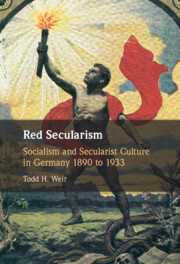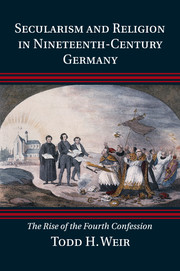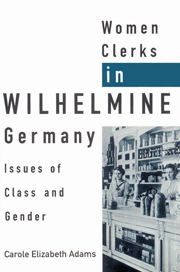Red Secularism
Red Secularism is the first substantive investigation into one of the key sources of radicalism in modern German, the subculture that arose at the intersection of secularism and socialism in the late nineteenth-century. It explores the organizations that promoted their humanistic-monistic worldview through popular science and asks how this worldview shaped the biographies of ambitious self-educated workers and early feminists. Todd H. Weir shows how generations of secularist intellectuals staked out leading positions in the Social Democratic Party, but often lost them due to their penchant for dissent. Moving between local and national developments, this book examines the crucial role of red secularism in the political struggles over religion that rocked Germany and fed into the National Socialist dictatorship of 1933. This title is part of the Flip it Open Programme and may also be available Open Access. Check our website Cambridge Core for details.
- Sheds new light on the history of German socialism
- Describes secularism and socialism as two distinct cultures, opening up new understandings of religious and political interactions in the modern world
- Combines intellectual and cultural history, showing how different social groups – intellectuals, workers, women – made use of a secularist worldview for their own ends
- This title is part of the Flip it Open Programme and may also be available Open Access. Check our website Cambridge Core for details
Reviews & endorsements
'In a work of remarkable ambition and scope, Weir explores the complex relationship between socialism and secularism at a time when many workers retained ties to organized religion. Exposing the rifts within the German socialist movement over whether to pursue a radical secularist agenda, Weir's meticulous scholarship will be indispensable for all future scholars probing this relationship.' Mark Edward Ruff, author of The Battle for the Catholic Past in Germany, 1945–1980
'Red Secularism offers a panoramic history of the evolving relationship between socialism and secularism situated in one of the most complex sites and periods in modern European history: Germany between 1890 and 1933. Out of this dense, thorny context, Weir tells a story that allows the reader to put the historical concepts and actors in conversation. Red Secularism will be of great value not just for historians, but for anyone interested in religious-secular-political conflicts and their manifestations in contemporary life.' Victoria Smolkin, author of A Sacred Space Is Never Empty: A History of Soviet Atheism
'A must-read for scholars of (German)secularism, but also for those interested in the history and the historiography of social democracy, and for scholars of the history of modern Germany in general.' Katharina Neef, Secular Studies
Product details
December 2023Adobe eBook Reader
9781009463591
0 pages
This ISBN is for an eBook version which is distributed on our behalf by a third party.
Table of Contents
- 1. Introducing socialism and secularism as two cultures
- 2. Secularist culture in a working-class city: Berlin around 1890
- 3. Prometheans: secularist intellectuals on the socialist stage
- 4. The sociology and psychology of secularist intellectuals: dancing near the abyss
- 5. Workers and worldview
- 6. The politics of secularism 1905–1914
- 7. Secularists in war and revolution 1914–1922
- 8. Monism in the Weimar workers' culture movement
- 9. Culture war at the end of the Weimar republic
- Epilogue.








.jpg)